Corporate Governance & Ethics Report: A Case Study of Apple Inc.
VerifiedAdded on 2023/06/07
|12
|3681
|170
Report
AI Summary
This report provides an overview of Apple Inc.'s corporate governance structure, highlighting both its strengths and weaknesses. It delves into the company's internal mechanisms, the role of the board of directors, and the perspectives of shareholders and stakeholders. The report also addresses instances of corporate governance failures, such as the battery throttling scandal, examining the consequences these failures had on Apple's reputation and financial performance. Furthermore, the analysis includes a comparative evaluation of corporate governance systems in different regions, including Europe, the USA, and Asia, to contextualize Apple's approach. The report concludes by evaluating the various responses to corporate governance issues and the impact of government regulations on ethical considerations within business organizations.

Corporate Governance
and Ethics
and Ethics
Paraphrase This Document
Need a fresh take? Get an instant paraphrase of this document with our AI Paraphraser
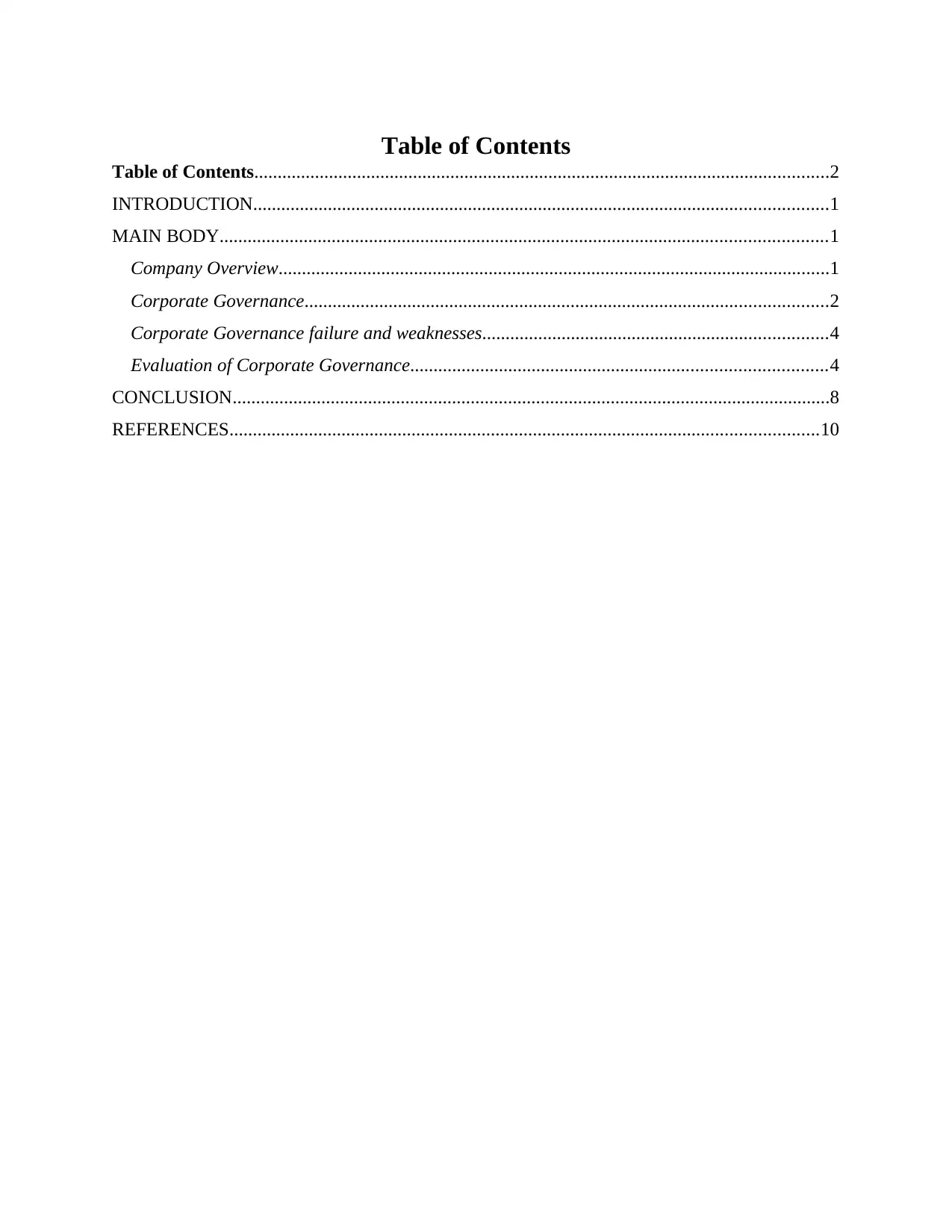
Table of Contents
Table of Contents...........................................................................................................................2
INTRODUCTION...........................................................................................................................1
MAIN BODY..................................................................................................................................1
Company Overview......................................................................................................................1
Corporate Governance................................................................................................................2
Corporate Governance failure and weaknesses..........................................................................4
Evaluation of Corporate Governance.........................................................................................4
CONCLUSION................................................................................................................................8
REFERENCES..............................................................................................................................10
Table of Contents...........................................................................................................................2
INTRODUCTION...........................................................................................................................1
MAIN BODY..................................................................................................................................1
Company Overview......................................................................................................................1
Corporate Governance................................................................................................................2
Corporate Governance failure and weaknesses..........................................................................4
Evaluation of Corporate Governance.........................................................................................4
CONCLUSION................................................................................................................................8
REFERENCES..............................................................................................................................10
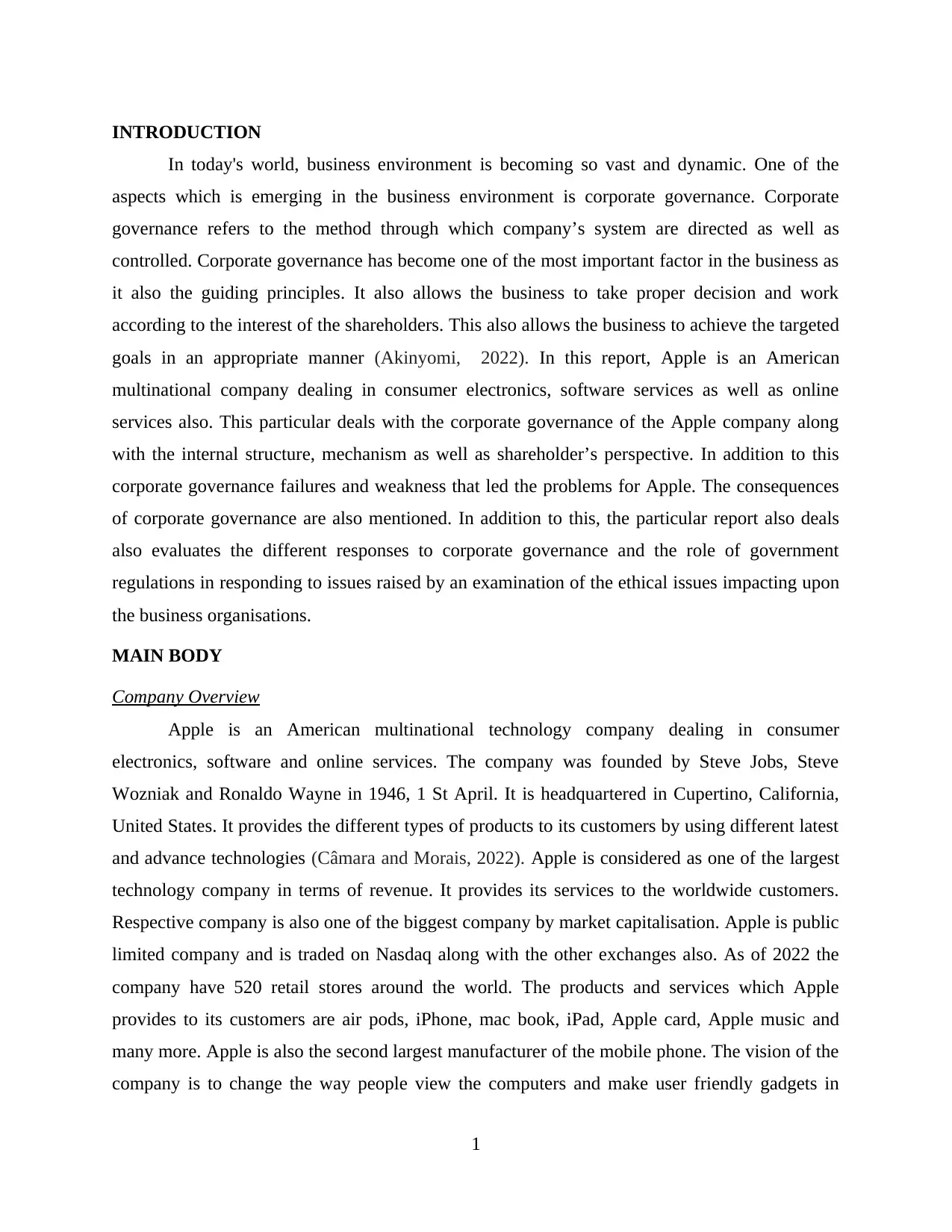
INTRODUCTION
In today's world, business environment is becoming so vast and dynamic. One of the
aspects which is emerging in the business environment is corporate governance. Corporate
governance refers to the method through which company’s system are directed as well as
controlled. Corporate governance has become one of the most important factor in the business as
it also the guiding principles. It also allows the business to take proper decision and work
according to the interest of the shareholders. This also allows the business to achieve the targeted
goals in an appropriate manner (Akinyomi, 2022). In this report, Apple is an American
multinational company dealing in consumer electronics, software services as well as online
services also. This particular deals with the corporate governance of the Apple company along
with the internal structure, mechanism as well as shareholder’s perspective. In addition to this
corporate governance failures and weakness that led the problems for Apple. The consequences
of corporate governance are also mentioned. In addition to this, the particular report also deals
also evaluates the different responses to corporate governance and the role of government
regulations in responding to issues raised by an examination of the ethical issues impacting upon
the business organisations.
MAIN BODY
Company Overview
Apple is an American multinational technology company dealing in consumer
electronics, software and online services. The company was founded by Steve Jobs, Steve
Wozniak and Ronaldo Wayne in 1946, 1 St April. It is headquartered in Cupertino, California,
United States. It provides the different types of products to its customers by using different latest
and advance technologies (Câmara and Morais, 2022). Apple is considered as one of the largest
technology company in terms of revenue. It provides its services to the worldwide customers.
Respective company is also one of the biggest company by market capitalisation. Apple is public
limited company and is traded on Nasdaq along with the other exchanges also. As of 2022 the
company have 520 retail stores around the world. The products and services which Apple
provides to its customers are air pods, iPhone, mac book, iPad, Apple card, Apple music and
many more. Apple is also the second largest manufacturer of the mobile phone. The vision of the
company is to change the way people view the computers and make user friendly gadgets in
1
In today's world, business environment is becoming so vast and dynamic. One of the
aspects which is emerging in the business environment is corporate governance. Corporate
governance refers to the method through which company’s system are directed as well as
controlled. Corporate governance has become one of the most important factor in the business as
it also the guiding principles. It also allows the business to take proper decision and work
according to the interest of the shareholders. This also allows the business to achieve the targeted
goals in an appropriate manner (Akinyomi, 2022). In this report, Apple is an American
multinational company dealing in consumer electronics, software services as well as online
services also. This particular deals with the corporate governance of the Apple company along
with the internal structure, mechanism as well as shareholder’s perspective. In addition to this
corporate governance failures and weakness that led the problems for Apple. The consequences
of corporate governance are also mentioned. In addition to this, the particular report also deals
also evaluates the different responses to corporate governance and the role of government
regulations in responding to issues raised by an examination of the ethical issues impacting upon
the business organisations.
MAIN BODY
Company Overview
Apple is an American multinational technology company dealing in consumer
electronics, software and online services. The company was founded by Steve Jobs, Steve
Wozniak and Ronaldo Wayne in 1946, 1 St April. It is headquartered in Cupertino, California,
United States. It provides the different types of products to its customers by using different latest
and advance technologies (Câmara and Morais, 2022). Apple is considered as one of the largest
technology company in terms of revenue. It provides its services to the worldwide customers.
Respective company is also one of the biggest company by market capitalisation. Apple is public
limited company and is traded on Nasdaq along with the other exchanges also. As of 2022 the
company have 520 retail stores around the world. The products and services which Apple
provides to its customers are air pods, iPhone, mac book, iPad, Apple card, Apple music and
many more. Apple is also the second largest manufacturer of the mobile phone. The vision of the
company is to change the way people view the computers and make user friendly gadgets in
1
⊘ This is a preview!⊘
Do you want full access?
Subscribe today to unlock all pages.

Trusted by 1+ million students worldwide
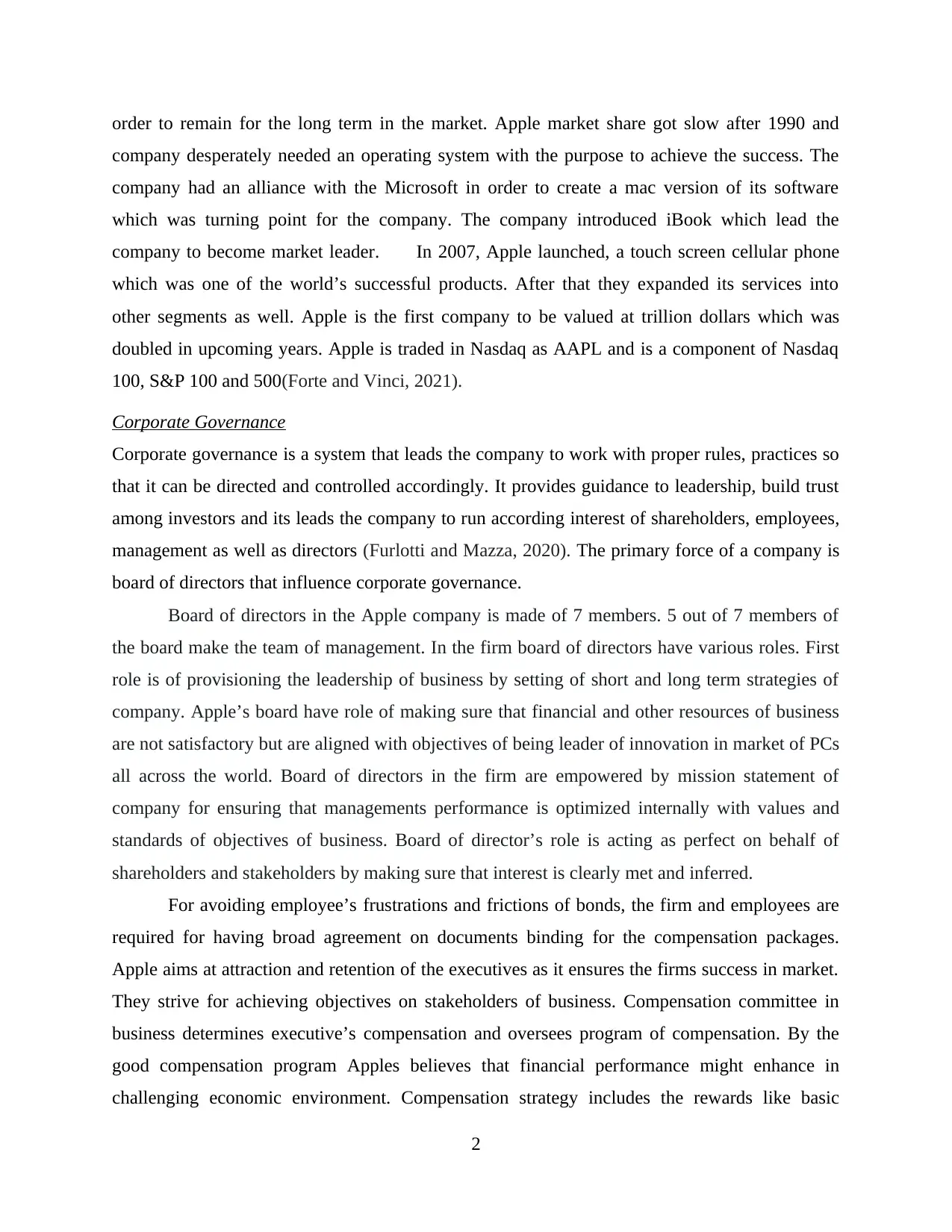
order to remain for the long term in the market. Apple market share got slow after 1990 and
company desperately needed an operating system with the purpose to achieve the success. The
company had an alliance with the Microsoft in order to create a mac version of its software
which was turning point for the company. The company introduced iBook which lead the
company to become market leader. In 2007, Apple launched, a touch screen cellular phone
which was one of the world’s successful products. After that they expanded its services into
other segments as well. Apple is the first company to be valued at trillion dollars which was
doubled in upcoming years. Apple is traded in Nasdaq as AAPL and is a component of Nasdaq
100, S&P 100 and 500(Forte and Vinci, 2021).
Corporate Governance
Corporate governance is a system that leads the company to work with proper rules, practices so
that it can be directed and controlled accordingly. It provides guidance to leadership, build trust
among investors and its leads the company to run according interest of shareholders, employees,
management as well as directors (Furlotti and Mazza, 2020). The primary force of a company is
board of directors that influence corporate governance.
Board of directors in the Apple company is made of 7 members. 5 out of 7 members of
the board make the team of management. In the firm board of directors have various roles. First
role is of provisioning the leadership of business by setting of short and long term strategies of
company. Apple’s board have role of making sure that financial and other resources of business
are not satisfactory but are aligned with objectives of being leader of innovation in market of PCs
all across the world. Board of directors in the firm are empowered by mission statement of
company for ensuring that managements performance is optimized internally with values and
standards of objectives of business. Board of director’s role is acting as perfect on behalf of
shareholders and stakeholders by making sure that interest is clearly met and inferred.
For avoiding employee’s frustrations and frictions of bonds, the firm and employees are
required for having broad agreement on documents binding for the compensation packages.
Apple aims at attraction and retention of the executives as it ensures the firms success in market.
They strive for achieving objectives on stakeholders of business. Compensation committee in
business determines executive’s compensation and oversees program of compensation. By the
good compensation program Apples believes that financial performance might enhance in
challenging economic environment. Compensation strategy includes the rewards like basic
2
company desperately needed an operating system with the purpose to achieve the success. The
company had an alliance with the Microsoft in order to create a mac version of its software
which was turning point for the company. The company introduced iBook which lead the
company to become market leader. In 2007, Apple launched, a touch screen cellular phone
which was one of the world’s successful products. After that they expanded its services into
other segments as well. Apple is the first company to be valued at trillion dollars which was
doubled in upcoming years. Apple is traded in Nasdaq as AAPL and is a component of Nasdaq
100, S&P 100 and 500(Forte and Vinci, 2021).
Corporate Governance
Corporate governance is a system that leads the company to work with proper rules, practices so
that it can be directed and controlled accordingly. It provides guidance to leadership, build trust
among investors and its leads the company to run according interest of shareholders, employees,
management as well as directors (Furlotti and Mazza, 2020). The primary force of a company is
board of directors that influence corporate governance.
Board of directors in the Apple company is made of 7 members. 5 out of 7 members of
the board make the team of management. In the firm board of directors have various roles. First
role is of provisioning the leadership of business by setting of short and long term strategies of
company. Apple’s board have role of making sure that financial and other resources of business
are not satisfactory but are aligned with objectives of being leader of innovation in market of PCs
all across the world. Board of directors in the firm are empowered by mission statement of
company for ensuring that managements performance is optimized internally with values and
standards of objectives of business. Board of director’s role is acting as perfect on behalf of
shareholders and stakeholders by making sure that interest is clearly met and inferred.
For avoiding employee’s frustrations and frictions of bonds, the firm and employees are
required for having broad agreement on documents binding for the compensation packages.
Apple aims at attraction and retention of the executives as it ensures the firms success in market.
They strive for achieving objectives on stakeholders of business. Compensation committee in
business determines executive’s compensation and oversees program of compensation. By the
good compensation program Apples believes that financial performance might enhance in
challenging economic environment. Compensation strategy includes the rewards like basic
2
Paraphrase This Document
Need a fresh take? Get an instant paraphrase of this document with our AI Paraphraser
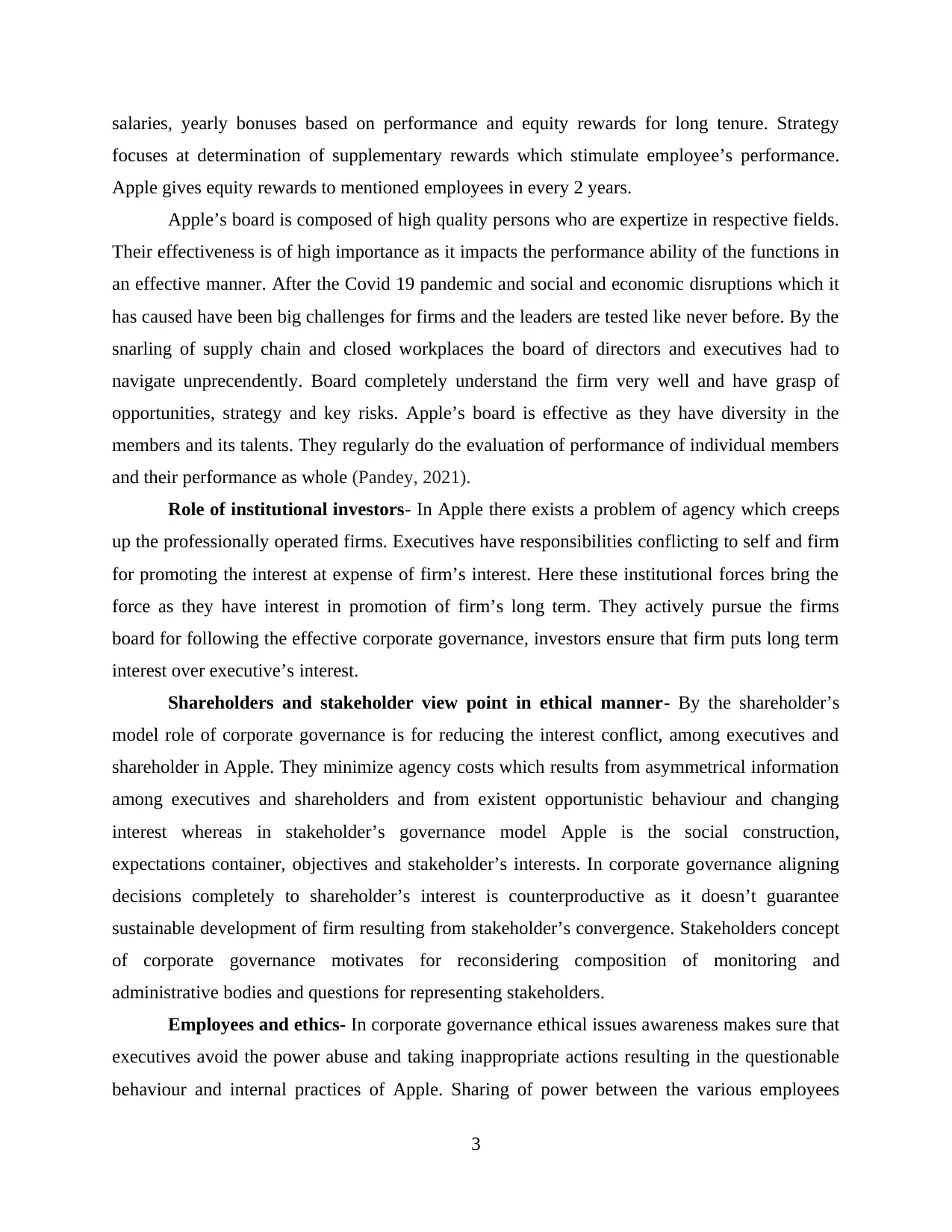
salaries, yearly bonuses based on performance and equity rewards for long tenure. Strategy
focuses at determination of supplementary rewards which stimulate employee’s performance.
Apple gives equity rewards to mentioned employees in every 2 years.
Apple’s board is composed of high quality persons who are expertize in respective fields.
Their effectiveness is of high importance as it impacts the performance ability of the functions in
an effective manner. After the Covid 19 pandemic and social and economic disruptions which it
has caused have been big challenges for firms and the leaders are tested like never before. By the
snarling of supply chain and closed workplaces the board of directors and executives had to
navigate unprecendently. Board completely understand the firm very well and have grasp of
opportunities, strategy and key risks. Apple’s board is effective as they have diversity in the
members and its talents. They regularly do the evaluation of performance of individual members
and their performance as whole (Pandey, 2021).
Role of institutional investors- In Apple there exists a problem of agency which creeps
up the professionally operated firms. Executives have responsibilities conflicting to self and firm
for promoting the interest at expense of firm’s interest. Here these institutional forces bring the
force as they have interest in promotion of firm’s long term. They actively pursue the firms
board for following the effective corporate governance, investors ensure that firm puts long term
interest over executive’s interest.
Shareholders and stakeholder view point in ethical manner- By the shareholder’s
model role of corporate governance is for reducing the interest conflict, among executives and
shareholder in Apple. They minimize agency costs which results from asymmetrical information
among executives and shareholders and from existent opportunistic behaviour and changing
interest whereas in stakeholder’s governance model Apple is the social construction,
expectations container, objectives and stakeholder’s interests. In corporate governance aligning
decisions completely to shareholder’s interest is counterproductive as it doesn’t guarantee
sustainable development of firm resulting from stakeholder’s convergence. Stakeholders concept
of corporate governance motivates for reconsidering composition of monitoring and
administrative bodies and questions for representing stakeholders.
Employees and ethics- In corporate governance ethical issues awareness makes sure that
executives avoid the power abuse and taking inappropriate actions resulting in the questionable
behaviour and internal practices of Apple. Sharing of power between the various employees
3
focuses at determination of supplementary rewards which stimulate employee’s performance.
Apple gives equity rewards to mentioned employees in every 2 years.
Apple’s board is composed of high quality persons who are expertize in respective fields.
Their effectiveness is of high importance as it impacts the performance ability of the functions in
an effective manner. After the Covid 19 pandemic and social and economic disruptions which it
has caused have been big challenges for firms and the leaders are tested like never before. By the
snarling of supply chain and closed workplaces the board of directors and executives had to
navigate unprecendently. Board completely understand the firm very well and have grasp of
opportunities, strategy and key risks. Apple’s board is effective as they have diversity in the
members and its talents. They regularly do the evaluation of performance of individual members
and their performance as whole (Pandey, 2021).
Role of institutional investors- In Apple there exists a problem of agency which creeps
up the professionally operated firms. Executives have responsibilities conflicting to self and firm
for promoting the interest at expense of firm’s interest. Here these institutional forces bring the
force as they have interest in promotion of firm’s long term. They actively pursue the firms
board for following the effective corporate governance, investors ensure that firm puts long term
interest over executive’s interest.
Shareholders and stakeholder view point in ethical manner- By the shareholder’s
model role of corporate governance is for reducing the interest conflict, among executives and
shareholder in Apple. They minimize agency costs which results from asymmetrical information
among executives and shareholders and from existent opportunistic behaviour and changing
interest whereas in stakeholder’s governance model Apple is the social construction,
expectations container, objectives and stakeholder’s interests. In corporate governance aligning
decisions completely to shareholder’s interest is counterproductive as it doesn’t guarantee
sustainable development of firm resulting from stakeholder’s convergence. Stakeholders concept
of corporate governance motivates for reconsidering composition of monitoring and
administrative bodies and questions for representing stakeholders.
Employees and ethics- In corporate governance ethical issues awareness makes sure that
executives avoid the power abuse and taking inappropriate actions resulting in the questionable
behaviour and internal practices of Apple. Sharing of power between the various employees
3
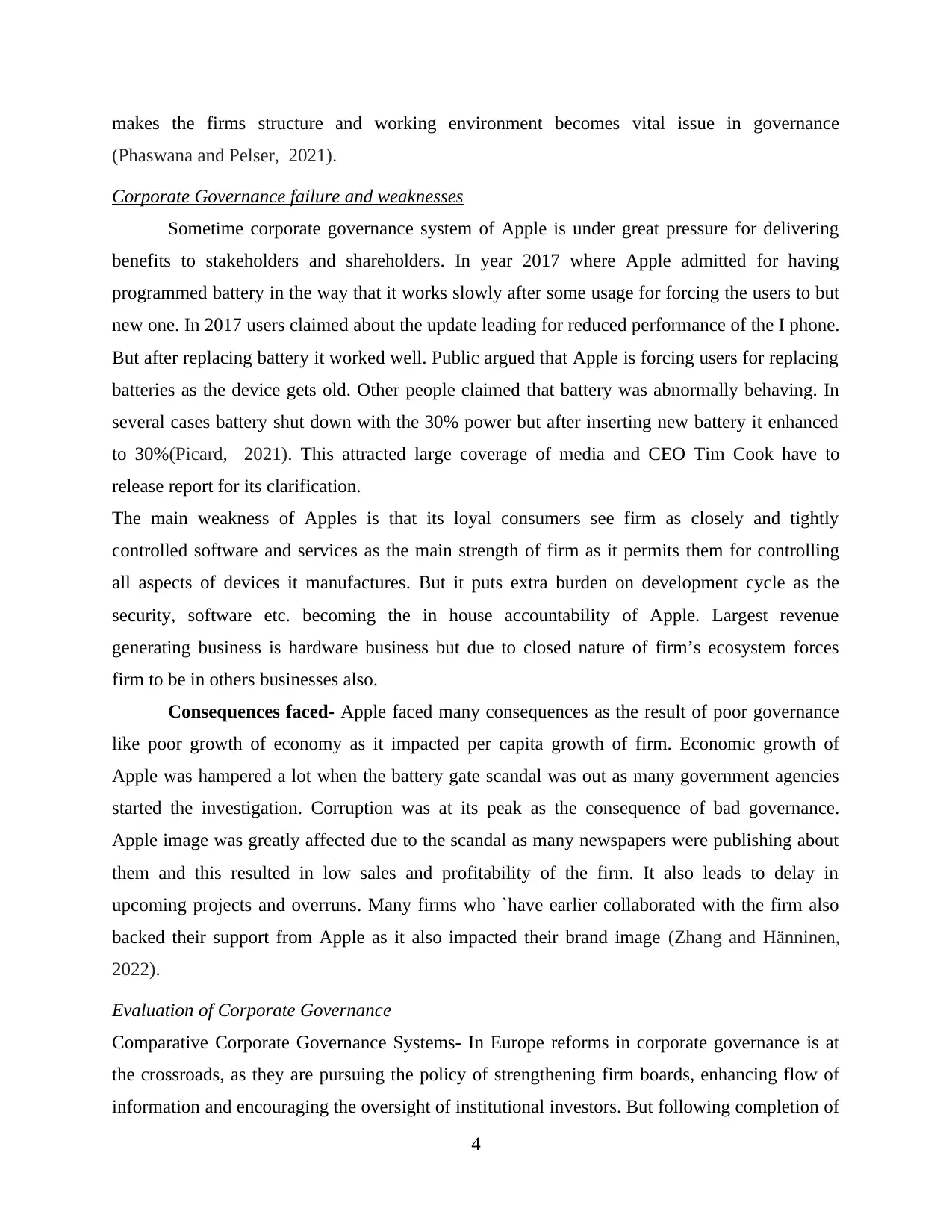
makes the firms structure and working environment becomes vital issue in governance
(Phaswana and Pelser, 2021).
Corporate Governance failure and weaknesses
Sometime corporate governance system of Apple is under great pressure for delivering
benefits to stakeholders and shareholders. In year 2017 where Apple admitted for having
programmed battery in the way that it works slowly after some usage for forcing the users to but
new one. In 2017 users claimed about the update leading for reduced performance of the I phone.
But after replacing battery it worked well. Public argued that Apple is forcing users for replacing
batteries as the device gets old. Other people claimed that battery was abnormally behaving. In
several cases battery shut down with the 30% power but after inserting new battery it enhanced
to 30%(Picard, 2021). This attracted large coverage of media and CEO Tim Cook have to
release report for its clarification.
The main weakness of Apples is that its loyal consumers see firm as closely and tightly
controlled software and services as the main strength of firm as it permits them for controlling
all aspects of devices it manufactures. But it puts extra burden on development cycle as the
security, software etc. becoming the in house accountability of Apple. Largest revenue
generating business is hardware business but due to closed nature of firm’s ecosystem forces
firm to be in others businesses also.
Consequences faced- Apple faced many consequences as the result of poor governance
like poor growth of economy as it impacted per capita growth of firm. Economic growth of
Apple was hampered a lot when the battery gate scandal was out as many government agencies
started the investigation. Corruption was at its peak as the consequence of bad governance.
Apple image was greatly affected due to the scandal as many newspapers were publishing about
them and this resulted in low sales and profitability of the firm. It also leads to delay in
upcoming projects and overruns. Many firms who `have earlier collaborated with the firm also
backed their support from Apple as it also impacted their brand image (Zhang and Hänninen,
2022).
Evaluation of Corporate Governance
Comparative Corporate Governance Systems- In Europe reforms in corporate governance is at
the crossroads, as they are pursuing the policy of strengthening firm boards, enhancing flow of
information and encouraging the oversight of institutional investors. But following completion of
4
(Phaswana and Pelser, 2021).
Corporate Governance failure and weaknesses
Sometime corporate governance system of Apple is under great pressure for delivering
benefits to stakeholders and shareholders. In year 2017 where Apple admitted for having
programmed battery in the way that it works slowly after some usage for forcing the users to but
new one. In 2017 users claimed about the update leading for reduced performance of the I phone.
But after replacing battery it worked well. Public argued that Apple is forcing users for replacing
batteries as the device gets old. Other people claimed that battery was abnormally behaving. In
several cases battery shut down with the 30% power but after inserting new battery it enhanced
to 30%(Picard, 2021). This attracted large coverage of media and CEO Tim Cook have to
release report for its clarification.
The main weakness of Apples is that its loyal consumers see firm as closely and tightly
controlled software and services as the main strength of firm as it permits them for controlling
all aspects of devices it manufactures. But it puts extra burden on development cycle as the
security, software etc. becoming the in house accountability of Apple. Largest revenue
generating business is hardware business but due to closed nature of firm’s ecosystem forces
firm to be in others businesses also.
Consequences faced- Apple faced many consequences as the result of poor governance
like poor growth of economy as it impacted per capita growth of firm. Economic growth of
Apple was hampered a lot when the battery gate scandal was out as many government agencies
started the investigation. Corruption was at its peak as the consequence of bad governance.
Apple image was greatly affected due to the scandal as many newspapers were publishing about
them and this resulted in low sales and profitability of the firm. It also leads to delay in
upcoming projects and overruns. Many firms who `have earlier collaborated with the firm also
backed their support from Apple as it also impacted their brand image (Zhang and Hänninen,
2022).
Evaluation of Corporate Governance
Comparative Corporate Governance Systems- In Europe reforms in corporate governance is at
the crossroads, as they are pursuing the policy of strengthening firm boards, enhancing flow of
information and encouraging the oversight of institutional investors. But following completion of
4
⊘ This is a preview!⊘
Do you want full access?
Subscribe today to unlock all pages.

Trusted by 1+ million students worldwide
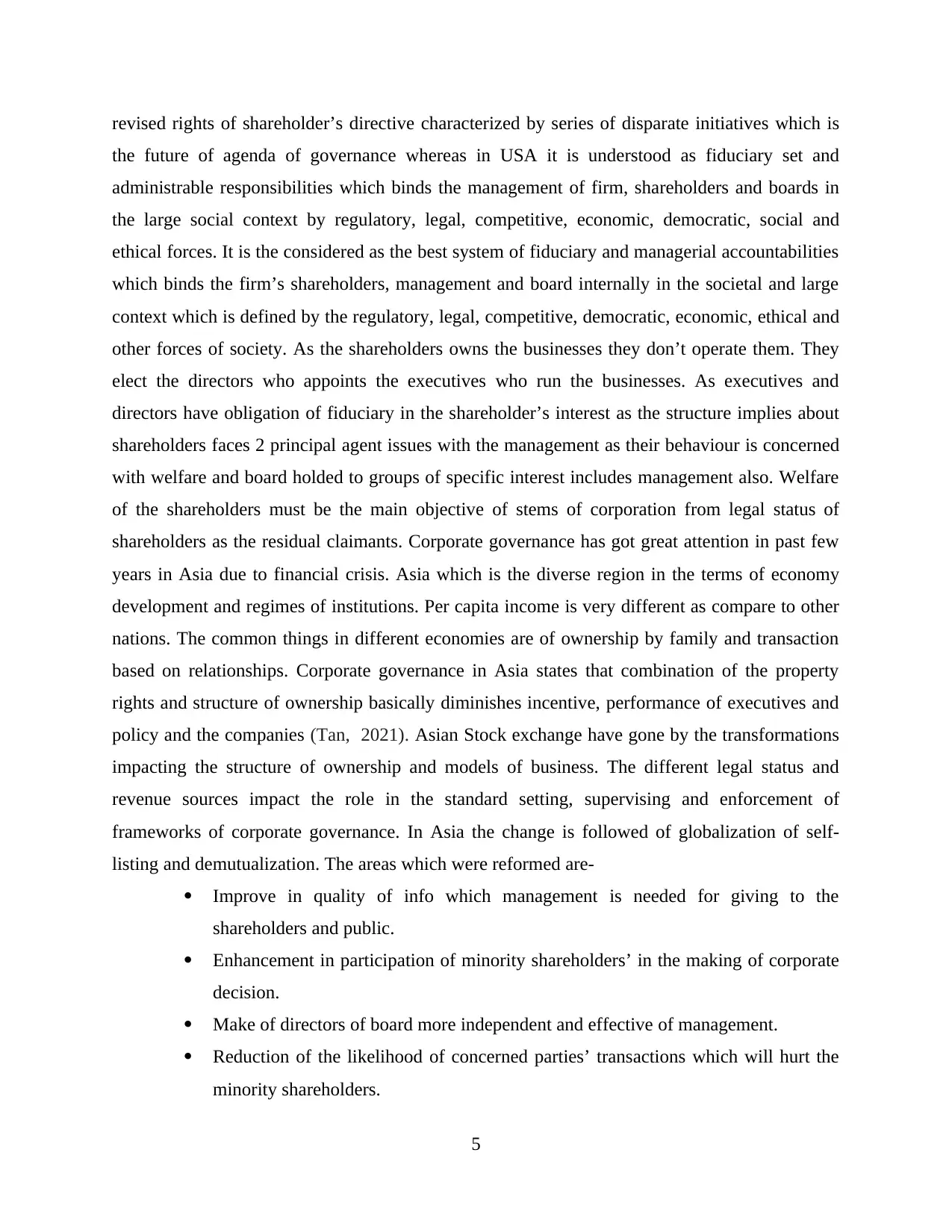
revised rights of shareholder’s directive characterized by series of disparate initiatives which is
the future of agenda of governance whereas in USA it is understood as fiduciary set and
administrable responsibilities which binds the management of firm, shareholders and boards in
the large social context by regulatory, legal, competitive, economic, democratic, social and
ethical forces. It is the considered as the best system of fiduciary and managerial accountabilities
which binds the firm’s shareholders, management and board internally in the societal and large
context which is defined by the regulatory, legal, competitive, democratic, economic, ethical and
other forces of society. As the shareholders owns the businesses they don’t operate them. They
elect the directors who appoints the executives who run the businesses. As executives and
directors have obligation of fiduciary in the shareholder’s interest as the structure implies about
shareholders faces 2 principal agent issues with the management as their behaviour is concerned
with welfare and board holded to groups of specific interest includes management also. Welfare
of the shareholders must be the main objective of stems of corporation from legal status of
shareholders as the residual claimants. Corporate governance has got great attention in past few
years in Asia due to financial crisis. Asia which is the diverse region in the terms of economy
development and regimes of institutions. Per capita income is very different as compare to other
nations. The common things in different economies are of ownership by family and transaction
based on relationships. Corporate governance in Asia states that combination of the property
rights and structure of ownership basically diminishes incentive, performance of executives and
policy and the companies (Tan, 2021). Asian Stock exchange have gone by the transformations
impacting the structure of ownership and models of business. The different legal status and
revenue sources impact the role in the standard setting, supervising and enforcement of
frameworks of corporate governance. In Asia the change is followed of globalization of self-
listing and demutualization. The areas which were reformed are-
Improve in quality of info which management is needed for giving to the
shareholders and public.
Enhancement in participation of minority shareholders’ in the making of corporate
decision.
Make of directors of board more independent and effective of management.
Reduction of the likelihood of concerned parties’ transactions which will hurt the
minority shareholders.
5
the future of agenda of governance whereas in USA it is understood as fiduciary set and
administrable responsibilities which binds the management of firm, shareholders and boards in
the large social context by regulatory, legal, competitive, economic, democratic, social and
ethical forces. It is the considered as the best system of fiduciary and managerial accountabilities
which binds the firm’s shareholders, management and board internally in the societal and large
context which is defined by the regulatory, legal, competitive, democratic, economic, ethical and
other forces of society. As the shareholders owns the businesses they don’t operate them. They
elect the directors who appoints the executives who run the businesses. As executives and
directors have obligation of fiduciary in the shareholder’s interest as the structure implies about
shareholders faces 2 principal agent issues with the management as their behaviour is concerned
with welfare and board holded to groups of specific interest includes management also. Welfare
of the shareholders must be the main objective of stems of corporation from legal status of
shareholders as the residual claimants. Corporate governance has got great attention in past few
years in Asia due to financial crisis. Asia which is the diverse region in the terms of economy
development and regimes of institutions. Per capita income is very different as compare to other
nations. The common things in different economies are of ownership by family and transaction
based on relationships. Corporate governance in Asia states that combination of the property
rights and structure of ownership basically diminishes incentive, performance of executives and
policy and the companies (Tan, 2021). Asian Stock exchange have gone by the transformations
impacting the structure of ownership and models of business. The different legal status and
revenue sources impact the role in the standard setting, supervising and enforcement of
frameworks of corporate governance. In Asia the change is followed of globalization of self-
listing and demutualization. The areas which were reformed are-
Improve in quality of info which management is needed for giving to the
shareholders and public.
Enhancement in participation of minority shareholders’ in the making of corporate
decision.
Make of directors of board more independent and effective of management.
Reduction of the likelihood of concerned parties’ transactions which will hurt the
minority shareholders.
5
Paraphrase This Document
Need a fresh take? Get an instant paraphrase of this document with our AI Paraphraser
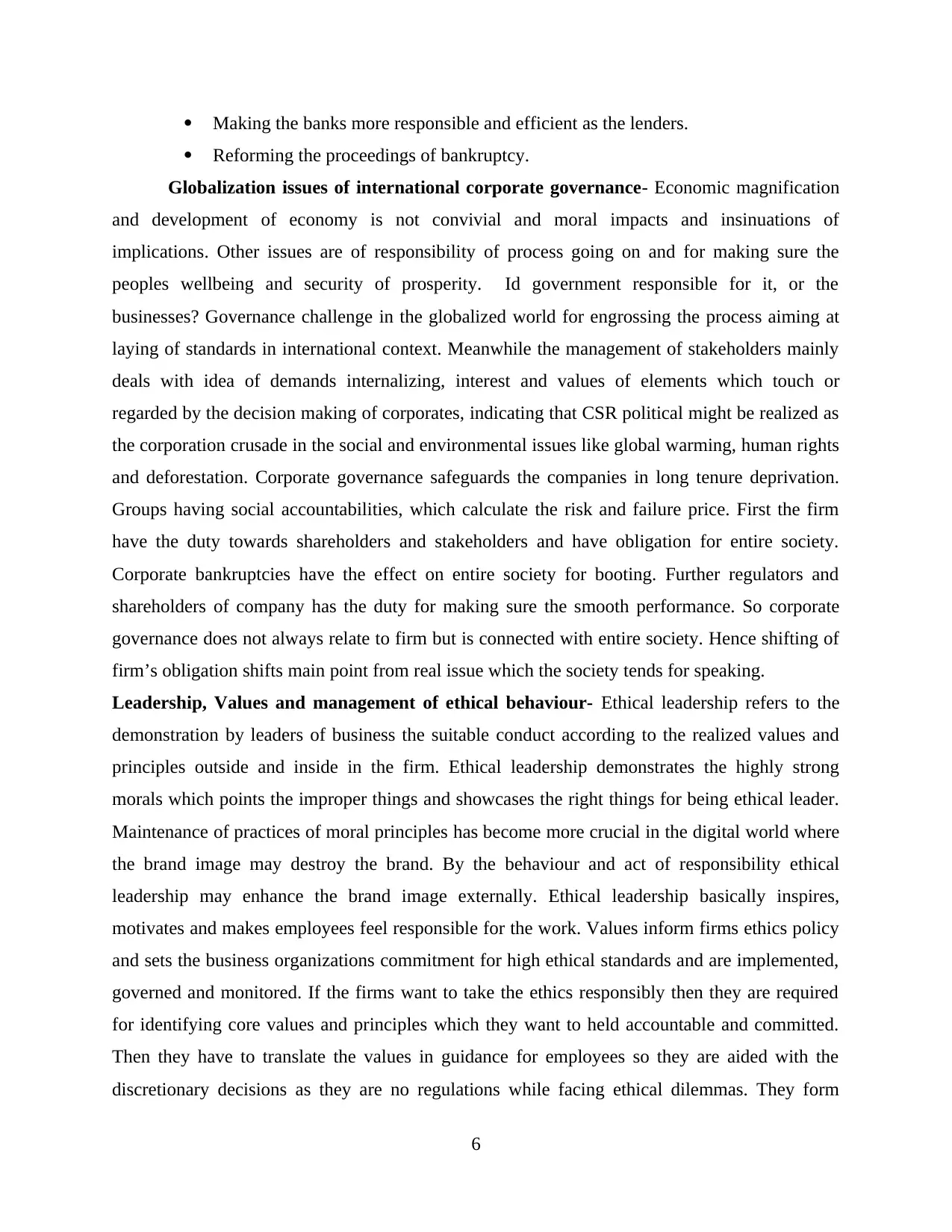
Making the banks more responsible and efficient as the lenders.
Reforming the proceedings of bankruptcy.
Globalization issues of international corporate governance- Economic magnification
and development of economy is not convivial and moral impacts and insinuations of
implications. Other issues are of responsibility of process going on and for making sure the
peoples wellbeing and security of prosperity. Id government responsible for it, or the
businesses? Governance challenge in the globalized world for engrossing the process aiming at
laying of standards in international context. Meanwhile the management of stakeholders mainly
deals with idea of demands internalizing, interest and values of elements which touch or
regarded by the decision making of corporates, indicating that CSR political might be realized as
the corporation crusade in the social and environmental issues like global warming, human rights
and deforestation. Corporate governance safeguards the companies in long tenure deprivation.
Groups having social accountabilities, which calculate the risk and failure price. First the firm
have the duty towards shareholders and stakeholders and have obligation for entire society.
Corporate bankruptcies have the effect on entire society for booting. Further regulators and
shareholders of company has the duty for making sure the smooth performance. So corporate
governance does not always relate to firm but is connected with entire society. Hence shifting of
firm’s obligation shifts main point from real issue which the society tends for speaking.
Leadership, Values and management of ethical behaviour- Ethical leadership refers to the
demonstration by leaders of business the suitable conduct according to the realized values and
principles outside and inside in the firm. Ethical leadership demonstrates the highly strong
morals which points the improper things and showcases the right things for being ethical leader.
Maintenance of practices of moral principles has become more crucial in the digital world where
the brand image may destroy the brand. By the behaviour and act of responsibility ethical
leadership may enhance the brand image externally. Ethical leadership basically inspires,
motivates and makes employees feel responsible for the work. Values inform firms ethics policy
and sets the business organizations commitment for high ethical standards and are implemented,
governed and monitored. If the firms want to take the ethics responsibly then they are required
for identifying core values and principles which they want to held accountable and committed.
Then they have to translate the values in guidance for employees so they are aided with the
discretionary decisions as they are no regulations while facing ethical dilemmas. They form
6
Reforming the proceedings of bankruptcy.
Globalization issues of international corporate governance- Economic magnification
and development of economy is not convivial and moral impacts and insinuations of
implications. Other issues are of responsibility of process going on and for making sure the
peoples wellbeing and security of prosperity. Id government responsible for it, or the
businesses? Governance challenge in the globalized world for engrossing the process aiming at
laying of standards in international context. Meanwhile the management of stakeholders mainly
deals with idea of demands internalizing, interest and values of elements which touch or
regarded by the decision making of corporates, indicating that CSR political might be realized as
the corporation crusade in the social and environmental issues like global warming, human rights
and deforestation. Corporate governance safeguards the companies in long tenure deprivation.
Groups having social accountabilities, which calculate the risk and failure price. First the firm
have the duty towards shareholders and stakeholders and have obligation for entire society.
Corporate bankruptcies have the effect on entire society for booting. Further regulators and
shareholders of company has the duty for making sure the smooth performance. So corporate
governance does not always relate to firm but is connected with entire society. Hence shifting of
firm’s obligation shifts main point from real issue which the society tends for speaking.
Leadership, Values and management of ethical behaviour- Ethical leadership refers to the
demonstration by leaders of business the suitable conduct according to the realized values and
principles outside and inside in the firm. Ethical leadership demonstrates the highly strong
morals which points the improper things and showcases the right things for being ethical leader.
Maintenance of practices of moral principles has become more crucial in the digital world where
the brand image may destroy the brand. By the behaviour and act of responsibility ethical
leadership may enhance the brand image externally. Ethical leadership basically inspires,
motivates and makes employees feel responsible for the work. Values inform firms ethics policy
and sets the business organizations commitment for high ethical standards and are implemented,
governed and monitored. If the firms want to take the ethics responsibly then they are required
for identifying core values and principles which they want to held accountable and committed.
Then they have to translate the values in guidance for employees so they are aided with the
discretionary decisions as they are no regulations while facing ethical dilemmas. They form
6
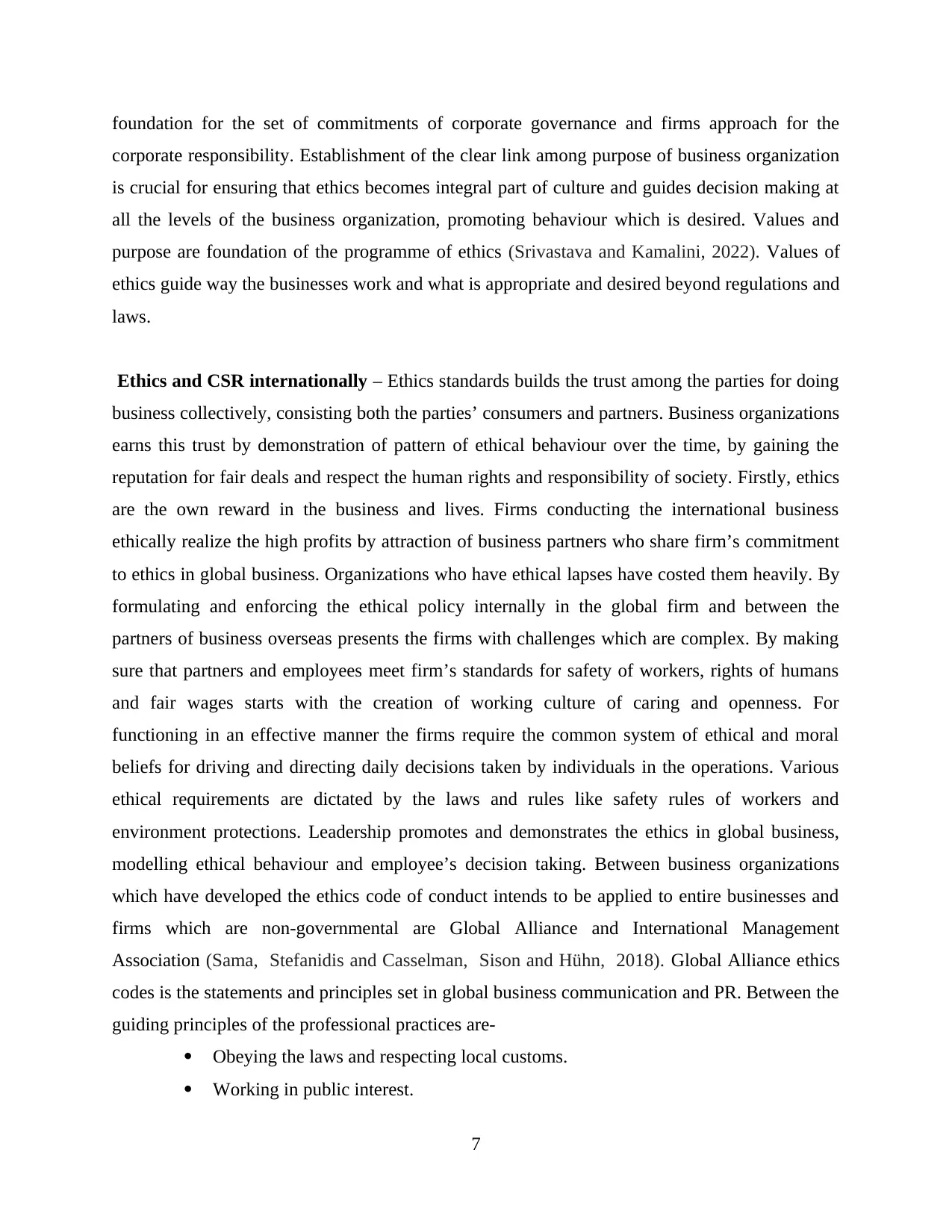
foundation for the set of commitments of corporate governance and firms approach for the
corporate responsibility. Establishment of the clear link among purpose of business organization
is crucial for ensuring that ethics becomes integral part of culture and guides decision making at
all the levels of the business organization, promoting behaviour which is desired. Values and
purpose are foundation of the programme of ethics (Srivastava and Kamalini, 2022). Values of
ethics guide way the businesses work and what is appropriate and desired beyond regulations and
laws.
Ethics and CSR internationally – Ethics standards builds the trust among the parties for doing
business collectively, consisting both the parties’ consumers and partners. Business organizations
earns this trust by demonstration of pattern of ethical behaviour over the time, by gaining the
reputation for fair deals and respect the human rights and responsibility of society. Firstly, ethics
are the own reward in the business and lives. Firms conducting the international business
ethically realize the high profits by attraction of business partners who share firm’s commitment
to ethics in global business. Organizations who have ethical lapses have costed them heavily. By
formulating and enforcing the ethical policy internally in the global firm and between the
partners of business overseas presents the firms with challenges which are complex. By making
sure that partners and employees meet firm’s standards for safety of workers, rights of humans
and fair wages starts with the creation of working culture of caring and openness. For
functioning in an effective manner the firms require the common system of ethical and moral
beliefs for driving and directing daily decisions taken by individuals in the operations. Various
ethical requirements are dictated by the laws and rules like safety rules of workers and
environment protections. Leadership promotes and demonstrates the ethics in global business,
modelling ethical behaviour and employee’s decision taking. Between business organizations
which have developed the ethics code of conduct intends to be applied to entire businesses and
firms which are non-governmental are Global Alliance and International Management
Association (Sama, Stefanidis and Casselman, Sison and Hühn, 2018). Global Alliance ethics
codes is the statements and principles set in global business communication and PR. Between the
guiding principles of the professional practices are-
Obeying the laws and respecting local customs.
Working in public interest.
7
corporate responsibility. Establishment of the clear link among purpose of business organization
is crucial for ensuring that ethics becomes integral part of culture and guides decision making at
all the levels of the business organization, promoting behaviour which is desired. Values and
purpose are foundation of the programme of ethics (Srivastava and Kamalini, 2022). Values of
ethics guide way the businesses work and what is appropriate and desired beyond regulations and
laws.
Ethics and CSR internationally – Ethics standards builds the trust among the parties for doing
business collectively, consisting both the parties’ consumers and partners. Business organizations
earns this trust by demonstration of pattern of ethical behaviour over the time, by gaining the
reputation for fair deals and respect the human rights and responsibility of society. Firstly, ethics
are the own reward in the business and lives. Firms conducting the international business
ethically realize the high profits by attraction of business partners who share firm’s commitment
to ethics in global business. Organizations who have ethical lapses have costed them heavily. By
formulating and enforcing the ethical policy internally in the global firm and between the
partners of business overseas presents the firms with challenges which are complex. By making
sure that partners and employees meet firm’s standards for safety of workers, rights of humans
and fair wages starts with the creation of working culture of caring and openness. For
functioning in an effective manner the firms require the common system of ethical and moral
beliefs for driving and directing daily decisions taken by individuals in the operations. Various
ethical requirements are dictated by the laws and rules like safety rules of workers and
environment protections. Leadership promotes and demonstrates the ethics in global business,
modelling ethical behaviour and employee’s decision taking. Between business organizations
which have developed the ethics code of conduct intends to be applied to entire businesses and
firms which are non-governmental are Global Alliance and International Management
Association (Sama, Stefanidis and Casselman, Sison and Hühn, 2018). Global Alliance ethics
codes is the statements and principles set in global business communication and PR. Between the
guiding principles of the professional practices are-
Obeying the laws and respecting local customs.
Working in public interest.
7
⊘ This is a preview!⊘
Do you want full access?
Subscribe today to unlock all pages.

Trusted by 1+ million students worldwide
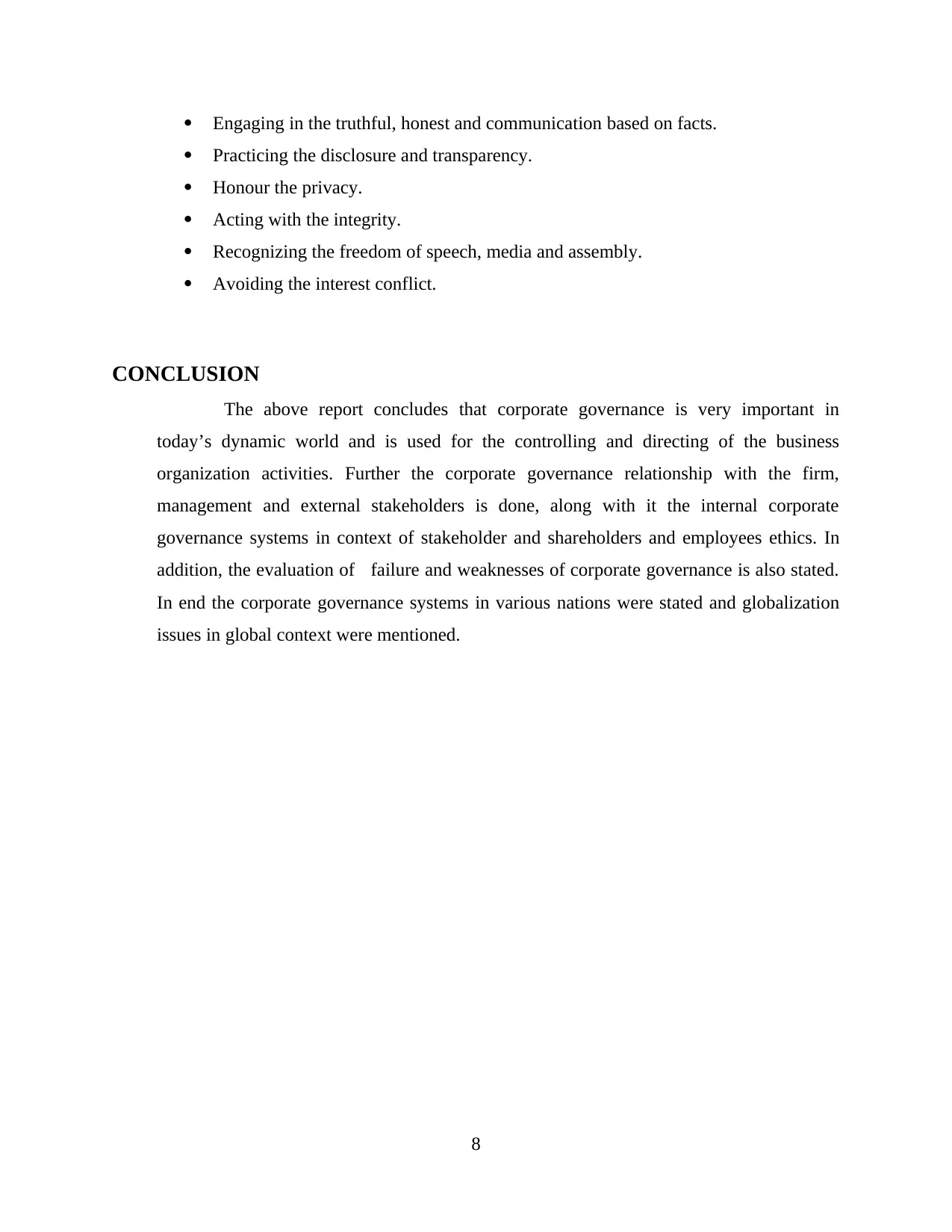
Engaging in the truthful, honest and communication based on facts.
Practicing the disclosure and transparency.
Honour the privacy.
Acting with the integrity.
Recognizing the freedom of speech, media and assembly.
Avoiding the interest conflict.
CONCLUSION
The above report concludes that corporate governance is very important in
today’s dynamic world and is used for the controlling and directing of the business
organization activities. Further the corporate governance relationship with the firm,
management and external stakeholders is done, along with it the internal corporate
governance systems in context of stakeholder and shareholders and employees ethics. In
addition, the evaluation of failure and weaknesses of corporate governance is also stated.
In end the corporate governance systems in various nations were stated and globalization
issues in global context were mentioned.
8
Practicing the disclosure and transparency.
Honour the privacy.
Acting with the integrity.
Recognizing the freedom of speech, media and assembly.
Avoiding the interest conflict.
CONCLUSION
The above report concludes that corporate governance is very important in
today’s dynamic world and is used for the controlling and directing of the business
organization activities. Further the corporate governance relationship with the firm,
management and external stakeholders is done, along with it the internal corporate
governance systems in context of stakeholder and shareholders and employees ethics. In
addition, the evaluation of failure and weaknesses of corporate governance is also stated.
In end the corporate governance systems in various nations were stated and globalization
issues in global context were mentioned.
8
Paraphrase This Document
Need a fresh take? Get an instant paraphrase of this document with our AI Paraphraser

9
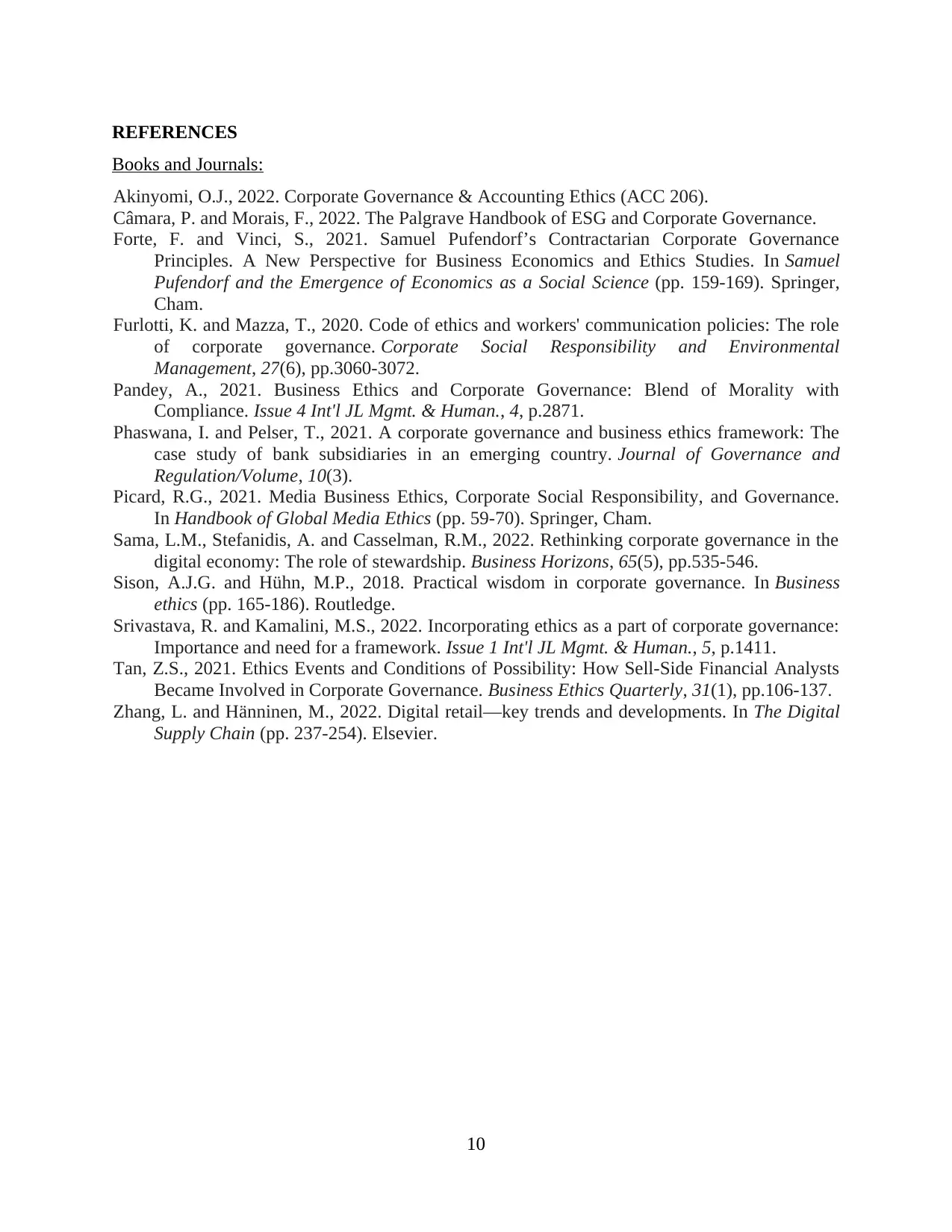
REFERENCES
Books and Journals:
Akinyomi, O.J., 2022. Corporate Governance & Accounting Ethics (ACC 206).
Câmara, P. and Morais, F., 2022. The Palgrave Handbook of ESG and Corporate Governance.
Forte, F. and Vinci, S., 2021. Samuel Pufendorf’s Contractarian Corporate Governance
Principles. A New Perspective for Business Economics and Ethics Studies. In Samuel
Pufendorf and the Emergence of Economics as a Social Science (pp. 159-169). Springer,
Cham.
Furlotti, K. and Mazza, T., 2020. Code of ethics and workers' communication policies: The role
of corporate governance. Corporate Social Responsibility and Environmental
Management, 27(6), pp.3060-3072.
Pandey, A., 2021. Business Ethics and Corporate Governance: Blend of Morality with
Compliance. Issue 4 Int'l JL Mgmt. & Human., 4, p.2871.
Phaswana, I. and Pelser, T., 2021. A corporate governance and business ethics framework: The
case study of bank subsidiaries in an emerging country. Journal of Governance and
Regulation/Volume, 10(3).
Picard, R.G., 2021. Media Business Ethics, Corporate Social Responsibility, and Governance.
In Handbook of Global Media Ethics (pp. 59-70). Springer, Cham.
Sama, L.M., Stefanidis, A. and Casselman, R.M., 2022. Rethinking corporate governance in the
digital economy: The role of stewardship. Business Horizons, 65(5), pp.535-546.
Sison, A.J.G. and Hühn, M.P., 2018. Practical wisdom in corporate governance. In Business
ethics (pp. 165-186). Routledge.
Srivastava, R. and Kamalini, M.S., 2022. Incorporating ethics as a part of corporate governance:
Importance and need for a framework. Issue 1 Int'l JL Mgmt. & Human., 5, p.1411.
Tan, Z.S., 2021. Ethics Events and Conditions of Possibility: How Sell-Side Financial Analysts
Became Involved in Corporate Governance. Business Ethics Quarterly, 31(1), pp.106-137.
Zhang, L. and Hänninen, M., 2022. Digital retail—key trends and developments. In The Digital
Supply Chain (pp. 237-254). Elsevier.
10
Books and Journals:
Akinyomi, O.J., 2022. Corporate Governance & Accounting Ethics (ACC 206).
Câmara, P. and Morais, F., 2022. The Palgrave Handbook of ESG and Corporate Governance.
Forte, F. and Vinci, S., 2021. Samuel Pufendorf’s Contractarian Corporate Governance
Principles. A New Perspective for Business Economics and Ethics Studies. In Samuel
Pufendorf and the Emergence of Economics as a Social Science (pp. 159-169). Springer,
Cham.
Furlotti, K. and Mazza, T., 2020. Code of ethics and workers' communication policies: The role
of corporate governance. Corporate Social Responsibility and Environmental
Management, 27(6), pp.3060-3072.
Pandey, A., 2021. Business Ethics and Corporate Governance: Blend of Morality with
Compliance. Issue 4 Int'l JL Mgmt. & Human., 4, p.2871.
Phaswana, I. and Pelser, T., 2021. A corporate governance and business ethics framework: The
case study of bank subsidiaries in an emerging country. Journal of Governance and
Regulation/Volume, 10(3).
Picard, R.G., 2021. Media Business Ethics, Corporate Social Responsibility, and Governance.
In Handbook of Global Media Ethics (pp. 59-70). Springer, Cham.
Sama, L.M., Stefanidis, A. and Casselman, R.M., 2022. Rethinking corporate governance in the
digital economy: The role of stewardship. Business Horizons, 65(5), pp.535-546.
Sison, A.J.G. and Hühn, M.P., 2018. Practical wisdom in corporate governance. In Business
ethics (pp. 165-186). Routledge.
Srivastava, R. and Kamalini, M.S., 2022. Incorporating ethics as a part of corporate governance:
Importance and need for a framework. Issue 1 Int'l JL Mgmt. & Human., 5, p.1411.
Tan, Z.S., 2021. Ethics Events and Conditions of Possibility: How Sell-Side Financial Analysts
Became Involved in Corporate Governance. Business Ethics Quarterly, 31(1), pp.106-137.
Zhang, L. and Hänninen, M., 2022. Digital retail—key trends and developments. In The Digital
Supply Chain (pp. 237-254). Elsevier.
10
⊘ This is a preview!⊘
Do you want full access?
Subscribe today to unlock all pages.

Trusted by 1+ million students worldwide
1 out of 12
Related Documents
Your All-in-One AI-Powered Toolkit for Academic Success.
+13062052269
info@desklib.com
Available 24*7 on WhatsApp / Email
![[object Object]](/_next/static/media/star-bottom.7253800d.svg)
Unlock your academic potential
Copyright © 2020–2026 A2Z Services. All Rights Reserved. Developed and managed by ZUCOL.




